| Srl | Item |
| 1 |
ID:
111051
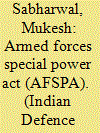

|
|
|
| 2 |
ID:
132032
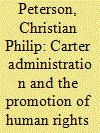

|
|
|
|
|
| Publication |
2014.
|
| Summary/Abstract |
This article will examine the effectiveness of the Carter administration's efforts to promote human rights in the Soviet Union. It will pay particular attention to how human rights promotion fit into a larger approach to transforming Superpower relations in ways favorable to U.S. interests called "reciprocal accommodation [détente]." The use of this framework provides an excellent way to tease out the complexities of how the administration balanced the promotion of human rights in the USSR with other important objectives such as concluding the SALT II treaty. It also helps reveal how executive branch worked to reduce Soviet human rights violations by citing the provisions of the Final Act and working with private citizens to raise international awareness about human rights issues. Without losing sight of his administration's inability to protect Soviet dissenters from arrest and harassment, this article will demonstrate that Carter had every intention of making the issue of human rights an important element of Cold War competition and implementing a new approach to détente that at least in part aimed at transforming Soviet internal behavior.
|
|
|
|
|
|
|
|
|
|
|
|
|
|
|
|
| 3 |
ID:
138344
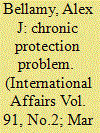

|
|
|
|
|
| Summary/Abstract |
The Democratic Peoples' Republic of Korea (DPRK) is arguably the world's most chronic abuser of human rights. In an unprecedented move, a Commission of Inquiry established by the UN's Human Rights Council accused the DPRK government of systematic violations of human rights amounting to crimes against humanity. In so doing, the Commission succeeded in putting human rights in the DPRK on the global agenda. Within months the UN's General Assembly and Security Council had joined the human rights body in examining the issue. This article explains the emergence of this new engagement with human rights in the DPRK, showing its relation to the ‘Responsibility to Protect’ principle. It charts the growing sense of frustration felt at the lack of progress on human rights in DPRK and shows how this was manifested in the General Assembly's decision to pursue the Commission's recommendations and call on the Security Council to take concrete steps. Despite this, however, the article shows that there are powerful obstacles in the way of a more robust international approach to human rights in the DPRK and counsels a less confrontational approach focused on engaging China and building trust within the Security Council.
|
|
|
|
|
|
|
|
|
|
|
|
|
|
|
|
| 4 |
ID:
128979


|
|
|
|
|
| Publication |
2014.
|
| Summary/Abstract |
Civil conflict appears to be contagious-scholars have shown that civil wars in a state's neighborhood make citizens more likely to rebel at home. However, war occurs when both rebels and the state engage in conflict. How do state authorities respond to the potential for civil conflict to spread? We argue that elites will anticipate the incentive-altering effects of civil wars abroad and increase repression at home to preempt potential rebellion. Using a Bayesian hierarchical model and spatially weighted conflict measures, we find robust evidence that a state will engage in higher levels of human rights violations as civil war becomes more prevalent in its geographic proximity. We thus find evidence that states violate rights as a function of the internal politics of other states. Further, we argue authorities will act not to mimic their neighbors but rather to avoid their fate.
|
|
|
|
|
|
|
|
|
|
|
|
|
|
|
|
| 5 |
ID:
112124
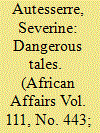

|
|
|
|
|
| Publication |
2012.
|
| Summary/Abstract |
Explanations for the persistence of violence in the eastern part of the Democratic Republic of Congo blame the incendiary actions of domestic and regional leaders, as well as the inefficacy of international peace-building efforts. Based on several years of ethnographic research, this article adds another piece to the puzzle, emphasizing the perverse consequences of well-meaning international efforts. I argue that three narratives dominate the public discourse on Congo and eclipse the numerous alternative framings of the situation. These narratives focus on a primary cause of violence, illegal exploitation of mineral resources; a main consequence, sexual abuse of women and girls; and a central solution, extending state authority. I elucidate why simple narratives are necessary for policy makers, journalists, advocacy groups, and practitioners on the ground, especially those involved in the Congo. I then consider each narrative in turn and explain how they achieved prominence: they provided straightforward explanations for the violence, suggested feasible solutions to it, and resonated with foreign audiences. I demonstrate that the focus on these narratives and on the solutions they recommended has led to results that clash with their intended purposes, notably an increase in human rights violations.
|
|
|
|
|
|
|
|
|
|
|
|
|
|
|
|
| 6 |
ID:
123449


|
|
|
|
|
| Publication |
2013.
|
| Summary/Abstract |
In East Singhbhum and Ranchi land acquisition has destroyed people's livelihood and social setting and violated basic human rights. The major impact of the takeover of tribal homelands has been the denigration of their culture, customs and language by mainstream communities. Pankaj Kumar examines impoverishment risk factors and their implications for poor people, based on data collected in the field.
|
|
|
|
|
|
|
|
|
|
|
|
|
|
|
|
| 7 |
ID:
130830
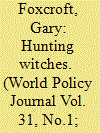

|
|
|
| 8 |
ID:
144698
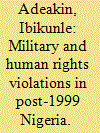

|
|
|
|
|
| Summary/Abstract |
Nigeria is currently faced with a series of internal security challenges that threaten the very existence of the country. In the areas where conflict has erupted, the military has been consistently accused of violating human rights during its operations. The aim of this article is to explore the claims of human rights abuses levelled against the military and assess the prospect of an effective internal enforcement mechanism. The study that forms the basis of this article involved interviews with 18 high-ranking serving and retired military officers. The empirical results suggest that there are four main areas that need to be strengthened to limit the alleged cases of human rights violations.
|
|
|
|
|
|
|
|
|
|
|
|
|
|
|
|
| 9 |
ID:
119556


|
|
|
| 10 |
ID:
168289
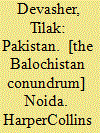

|
|
|
|
|
| Publication |
Noida, HarperCollins Publishers India, 2019.
|
| Description |
xxxi, 359p.hbk
|
| Standard Number |
9789353570705
|
|
|
|
|
|
|
|
|
|
|
|
Copies: C:1/I:0,R:0,Q:0
Circulation
| Accession# | Call# | Current Location | Status | Policy | Location |
| 059728 | 954.91/DEV 059728 | Main | On Shelf | General | |
|
|
|
|
| 11 |
ID:
128971
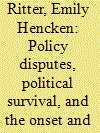

|
|
|
|
|
| Publication |
2014.
|
| Summary/Abstract |
Under what conditions will a state repress its citizens? The literature examining human rights violations lacks consensus over exactly how repression and dissent are interrelated. I argue that contradictions have arisen because scholars have not derived expectations consistent with modeling three common assumptions: (1) dissent and repression are causally interrelated (2) states and groups are in conflict over some policy or good and (3) authorities repress to remain in office. I develop a formal model based on these principles, and I predict that changes in the same independent variable can have divergent effects on the onset and severity of repression. Using coded event data for all states from 1990 to 2004 and a two-tiered estimator, I find that increases in executive job security decrease the likelihood that repression will occur in the first place, but increase the severity of observed violations.
|
|
|
|
|
|
|
|
|
|
|
|
|
|
|
|
| 12 |
ID:
165695
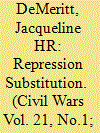

|
|
|
|
|
| Summary/Abstract |
Does the United Nations naming and shaming of specific violations of human rights decrease government repression? In this article, we argue that international shaming of specific human rights violations can weaken the target government, bringing new challenges and making the government cessation of repression less feasible. When international naming and shaming campaigns target specific repressive tactics, they increase the costs of some – but not all – means of repression. Using original data on naming and shaming by the United Nations Human Rights Council (HRC), we show that the shaming of one physical integrity violation is jointly associated with decreases in that violation and increases in other violations of human rights.
|
|
|
|
|
|
|
|
|
|
|
|
|
|
|
|
| 13 |
ID:
129464
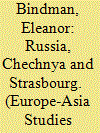

|
|
|
|
|
| Publication |
2013.
|
| Summary/Abstract |
This article explores contemporary Russian official and media discourse on cases concerning human rights violations in Chechnya which have been heard at the European Court of Human Rights. By comparing and contrasting the discourses on the Court's rulings which have been reproduced by various government representatives and various Russian newspapers, the article aims to demonstrate that, while official discourse remains critical of the Court's work with regard to Chechnya, reporting of such cases provides certain media outlets with the opportunity to criticise the government for its perceived failings in relation to safeguarding Chechnya's civilian population from human rights abuses.
|
|
|
|
|
|
|
|
|
|
|
|
|
|
|
|
| 14 |
ID:
170256
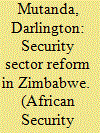

|
|
|
|
|
| Summary/Abstract |
Studies on security sector reform in Zimbabwe have largely taken the radical view that more often than not, the military has acted undemocratically through uttering and overseeing an array of operations meant to stifle democracy. Using document analysis, this article argues that police reform in Zimbabwe is imperative in ensuring the safety of the citizens who have since 1980 fallen victim to police unprofessionalism. There is sufficient evidence to suggest that any insightful discussion on security sector reform in Zimbabwe should take into account the role police have occupied in propping up ZANU PF since independence in 1980. Notwithstanding the volatile political environment that prevailed, it is the argument of this paper that the police were central to the survival of ZANU PF through the systematic execution of violence against the opposition; ignoring cases of political violence brought to them or even the ones they witnessed; carrying out politically-motivated arrests and dismissing alleged anti-ZANU PF police officers. It is therefore significant for Zimbabwe to speed up efforts to train and equip the police force with the requisite skills and weaponry so that they execute their duties within the confines of the country’s constitution.
|
|
|
|
|
|
|
|
|
|
|
|
|
|
|
|
| 15 |
ID:
159812
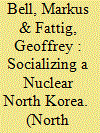

|
|
|
| 16 |
ID:
122001
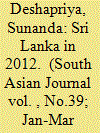

|
|
|
| 17 |
ID:
134048
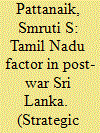

|
|
|
|
|
| Publication |
2014.
|
| Summary/Abstract |
Growing international concerns about human rights violations in the last phase of the Eelam war and the continued surveillance and intimidation of the Tamils in Sri Lanka have drawn the attention of their co-ethnics across the world. The southern Indian state of Tamil Nadu, which had detached itself from the political events in Sri Lanka after Rajiv Gandhi's assassination, has renewed its interest. In the post-war phase, the plight of Sri Lankan Tamils has become an emotive issue. Their grievances have been harnessed in recent years for political advantage by several political parties in Tamil Nadu. The politics of coalition has, in fact, made it difficult for New Delhi to pursue a policy independent of Tamil Nadu. This article examines how the Tamil-speaking people in Sri Lanka view the role of Tamil Nadu; their perception of the 13th Amendment; and India's options in post-war Sri Lanka
|
|
|
|
|
|
|
|
|
|
|
|
|
|
|
|
| 18 |
ID:
159566
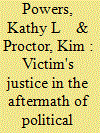

|
|
|
|
|
| Summary/Abstract |
Governments often award reparations to victims of mass human rights violations (HRVs) committed during political violence. Although international law requires that governments compensate victims of such violations, some states award reparations while others do not. This paper provides the first global analysis of the determinants of state reparations awards to victims of HRVs. Analyses consider the effects of multiple factors on reparations awards, whether a country has used other types of transitional justice mechanisms, economic development, and regime type. Spatial and rare events logit analyses on a new database for all countries between 1969 and 2006 suggest that wealthy, democratic countries as well as governments that already employ other transitional justice mechanisms are more likely to actually pay reparations to victims than are other governments.
|
|
|
|
|
|
|
|
|
|
|
|
|
|
|
|